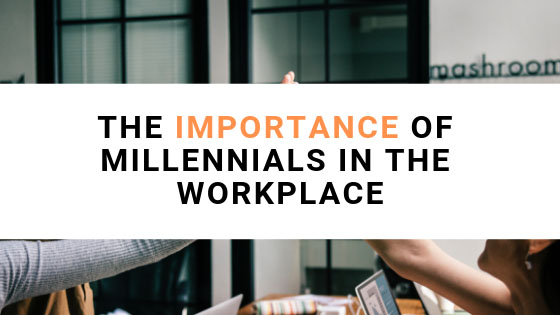The importance of millennials in the workplace

The millennial generation are shaping the world of work through their career ambitions, attitudes about the workplace, and knowledge of new technologies. Attracting the best millennial workers is critical to the future of business success. Which means that becoming the best worker out there ensures that you will be invaluable to an organisation.
It’s true that the way that millennials’ use technology sets them apart. They have a definite affinity with the digital world. This is the first generation to enter the workplace with a better grasp of a key business technological tools than more senior workers. Because of this ease with technology, millennials are inherently collaborative and enjoy learning in teams, both face-to-face and through digital platforms, including webinars or interactive games.
PwC’s 14th Annual Global CEO Survey unveiled the following “Millennials tend to be uncomfortable with rigid corporate structures and turned off by information silos. They expect rapid progression, a varied and interesting career and constant feedback. In other words, millennials want a management style and corporate culture that is markedly different from anything that has gone before – one that meets their needs.”
And so, business leaders and human resources departments need to adjust their talent management strategies. Millennials place their focus on different things.
They are looking for flexi-hours, recognition and praise, training, leave days and constructive feedback. Not to say that financial rewards aren’t important, but they are looking for more
CEOs are saying that attracting and keeping younger workers is one of their biggest talent challenges. Generally younger generations, and their need for purpose as well as value add, means that they don’t stick out a job for long.
Companies who are naturally more innovative and not constrained by the past, companies such as Google, have a more successful approach to recruitment and retention. This new workforce is looking to do something that feels worthwhile, that adds value and that is ethical. They are motivated by more than just money.
Why Work-Life Balance Matters to Millennials
Work/life balance has always been a priority for millennials and research has shown that companies need to ensure that they’re not creating expectations that are unrealistic and could lead to unhappy employees. Mentoring and coaching are also top of the list in terms of worker requirements and a focus on learning by doing means that having a supportive work environment, access to on-the-job training and personal development plans are important.
This younger generation of workers have been defined by their optimism and energy and they believe they can achieve anything with the right focus and access to learning. The economic and global crisis has not dented the optimism of the millennial.
Newer generations, like Gen Z’s or post-millennials, are continuing to disrupt and bring change to the 21st century landscape. Gen Z has higher expectations than millennials in terms of speed, delivery and loyalty.
Some of the other disruptions will include entrepreneurship, inclusive design, global thinking, individuality and early entry into the workplace.
Gen Z’s are talking about going straight from school to the workplace. With the 21st century world forcing adaptability and flexibility, they are not connecting with the value of a 3-year qualification over workplace and online learning.
Although change is here, and we can’t predict how every aspect of our life will be affected, we can be prepared. We can suit up, skill up and show up. We can read, learn, debate and grow.
Tag:millennials, skills, workplace


